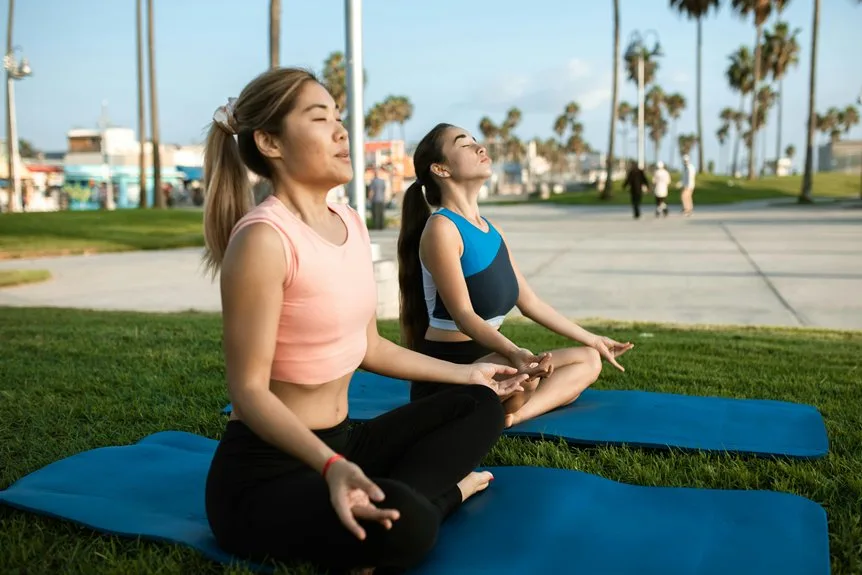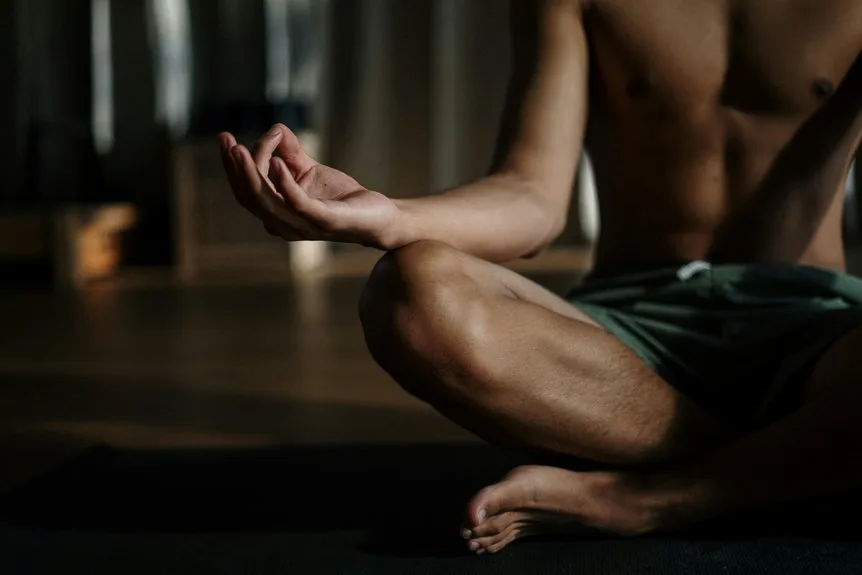Meditation isn’t just for monks or people sitting cross-legged on mountaintops—it can actually make everyday life smoother and less stressful. From sharpening focus to calming the mind, meditation offers practical benefits that anyone can appreciate. Imagine getting better sleep, handling tough emotions with more ease, and even feeling a bit kinder—these are just a few ways meditation gives mental health a lift. Curious about the rest? There’s more to this mindful practice than meets the eye.
Reduces Stress and Promotes Calm
While life can feel like a nonstop race, meditation offers a welcome pause button that helps the mind and body unwind. People use this relaxing practice to reduce stress and create a sense of calm, even on hectic days.
Meditation lowers stress levels by encouraging relaxation and dialing down cortisol, the stress hormone. This simple act of sitting quietly can help manage stress and bring emotional balance, supporting better mental health.
It even helps people relax faster at bedtime and experience fewer restless nights. Over time, meditation leads to noticeable stress reduction, making it easier to handle whatever life brings. For those seeking a personalized wellbeing journey, retreats like Sensei Porcupine Creek offer tailored programs to enhance mental health and relaxation.
Improves Focus and Memory
Many people notice that meditation can make it easier to stay on task and think clearly, even during hectic days. By practicing regularly, individuals may find their attention span grows longer and their minds become less cluttered, almost like clearing away mental cobwebs. This enhancement in cognitive clarity not only helps with remembering information, but also makes focusing on everyday tasks feel much less like a juggling act. At places like Two Bunch Palms, the emphasis on unwinding and unplugging can complement meditation practices and further enhance mental well-being.
Enhances Cognitive Clarity
It turns out that meditation isn’t just for finding a little peace and quiet—it’s also a real revolution when it comes to sharpening the mind. Mindfulness meditation, practiced regularly, builds cognitive clarity by rewiring neural pathways tied to attention and memory. Neuroimaging studies reveal increased gray matter density in brain regions responsible for concentration and mental organization. This means less mind-wandering and more mental focus when it’s needed most. People who meditate often notice stronger working memory and clearer thinking, making everyday tasks feel more manageable. In communities seeking connection, shared mindfulness brings a collective sense of clarity and purpose. The Stunning mountain views from every site at The Springs at Borrego RV Resort and Golf Course provide an ideal environment for practicing mindfulness and meditation.
Extends Attention Span
Sharper thinking is just the beginning—regular meditation also works wonders for stretching the attention span and enhancing focus. Studies show that mindfulness meditation, even for just 13 minutes daily, can improve cognitive performance, mental clarity, and memory.
By training the mind to be present, meditation strengthens neural pathways tied to attention control, making it easier to stay engaged and less distracted. This sense of belonging to the present moment boosts mental health and supports everyone aiming for better focus.
For those who seek a serene environment to practice meditation, the Kenwood Inn and Spa offers a tranquil setting with its luxurious amenities, making it an ideal retreat for enhancing mental well-being.
Here’s how daily meditation nurtures these benefits:
- Lengthens attention span
- Sharpens focus and memory
- Strengthens attention control neural pathways
Increases Attention Span
Ever wonder why some people seem to breeze through long tasks without losing their focus? Meditation might be their secret. Regular practice is linked to an increased attention span, sharper concentration, and enhanced mental clarity.
Techniques like mindfulness and focused breathing actually strengthen neural pathways tied to cognitive control, making it easier to tune out distractions. Research shows meditation helps people react faster and with more accuracy during attention-related tasks.
Over time, daily sessions can reduce distractibility and help maintain focus, so everyone can feel more present and engaged together. Simply put, meditation is like a workout for your mind’s focus.
Strengthens Willpower and Self-Control
While sticking to good habits or resisting temptations can sometimes feel like a real test of will, meditation quietly steps in as a powerful ally for building self-control. Regular mindfulness practice elevates mental discipline, encouraging the brain activity linked to perseverance and impulse control.
This helps people manage emotional reactions and develop resilience when faced with daily challenges. Over time, meditation creates a sense of self-awareness, making it easier to spot unhelpful patterns.
Some key ways meditation supports self-control include:
- Enhances emotional regulation for better decision-making
- Reinforces stress reduction, easing intense urges
- Builds perseverance to stick with positive changes
Enhances Sleep Quality
Meditation has a knack for making it easier to fall asleep, thanks to its calming effect on restless minds that tend to race at night.
People who meditate regularly often notice that their sleep feels deeper and more rejuvenating, almost like hitting a reset button.
Eases Falling Asleep
Getting a good night’s sleep can sometimes feel like chasing a moving target, especially when the mind just won’t quiet down. Meditation offers a gentle way to calm the mind and weave relaxation into your bedtime routine.
By focusing on mindfulness and breathing exercises, people can activate the parasympathetic nervous system, which signals the body that it’s time to rest. Studies show meditation can shorten the time it takes to fall asleep and help reduce insomnia.
For those searching for stress relief and better sleep quality, meditation may provide:
- Reduced racing thoughts
- Smoother progression into sleep
- Fewer nighttime awakenings
Promotes Restorative Sleep
A restful night isn’t just about how quickly someone drifts off—it’s about the quality of sleep that follows. Meditation helps create the conditions for restorative sleep by easing tension and quieting racing thoughts, which can often keep people tossing and turning.
Mindfulness practices support relaxation, allowing the body to enter deeper, more revitalizing stages of the sleep cycle. Regular meditation is known to reduce levels of cortisol, the stress hormone that can disrupt sleep quality and cause insomnia.
Supports Emotional Balance and Reduces Anxiety
Ever wonder why so many people turn to mindfulness when life feels overwhelming? Meditation offers real mental health benefits, especially for those seeking emotional balance and anxiety reduction. By practicing non-judgmental awareness, individuals improve emotional regulation, manage stress, and elevate overall emotional health.
Regular sessions have even been linked to lower cortisol levels and a steadier heart rate. Meditation isn’t just about sitting quietly—it’s an active way to nurture compassionate feelings and self-awareness.
Here’s how meditation supports emotional well-being:
- Encourages emotional regulation through mindful observation
- Reduces anxiety by lowering stress hormones
- Enhances emotional health and stability
Fosters Compassion and Self-Awareness
How is it that sitting quietly with one’s thoughts can actually make someone kinder, both to themselves and others? Meditation, especially practices like loving-kindness, enhances self-awareness and compassion by guiding people to notice their emotional responses with mindfulness.
This steady attention helps them understand their feelings, leading to better emotional regulation and inner peace. As self-acceptance grows, so does empathy, creating stronger bonds and positive attitudes.
Studies show meditation even reduces loneliness and supports personal growth. Over time, these moments of quiet reflection ripple outward, making it easier for individuals to respond to others with warmth and genuine understanding.
Frequently Asked Questions
How Does Meditation Improve Mental Health?
Meditation improves mental health by encouraging mindfulness benefits, stress reduction, and anxiety relief. It enhances emotional resilience, mood regulation, focus enhancement, cognitive clarity, self awareness, and sleep quality, while promoting neuroplasticity, supporting individuals seeking connection and well-being.
How Meditation Makes You Mentally Strong?
Meditation promotes mental strength through mindfulness practice, encouraging emotional resilience, stress reduction, and focus enhancement. It supports mood regulation, anxiety management, self awareness growth, cognitive flexibility, improved sleep quality, and positive thinking, helping individuals feel empowered and connected.
What Are 5 Ways to Improve Mental Health?
To improve mental health, individuals may engage in mindfulness practices, prioritize stress reduction, cultivate emotional resilience, enhance cognitive clarity, and promote mood enhancement. Emphasizing anxiety management, self-awareness, sleep quality, focus improvement, and resilience building further strengthens well-being.
What Is One Potential Effect of Meditation on Mental Health?
When considering the potential effects of meditation on mental health, individuals may experience enhanced emotional regulation and mindfulness awareness. This practice can nurture anxiety relief, promote stress reduction, improve self awareness, support mood stabilization, and encourage cognitive resilience within supportive communities.
Final Thoughts
Meditation is like a gentle breeze clearing away mental clutter, leaving the mind calm and refreshed. Visualize stress melting like ice under the sun, focus sharpening as if adjusting a camera lens, and sleep wrapping you up like a warm blanket. With each session, self-control grows stronger, emotions steady, and connections deepen. In a world full of noise, meditation offers a peaceful retreat, inviting everyone to step in, breathe deeply, and uncover a brighter, lighter mind.







